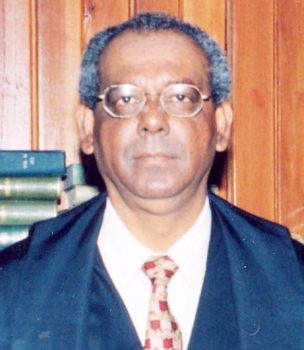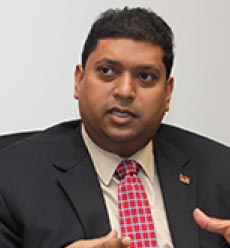The Petroleum Commission Bill, now before a parliamentary select committee, should be fine-tuned to make way for more Board Directors with broader powers to eliminate concerns about possible ministerial micro-management.
In addition, the country should use revenues received from the oil and gas industry to further develop existing sectors, placing special emphasis on agriculture and agro processing to minimise the region’s dependence on food imports while creating employment and income for Guyana’s citizenry.
So says both former Minister of Energy of Trinidad and Tobago, Kevin Ramnarine and former Speaker of the National Assembly and Senior Counsel, Ralph Ramkarran.
“The Board should appoint the Commissioner…the Board of the Com-mission should appoint the secretary, there should be a board member from civil society and a board member from academia, the board should also have a member from the Environ-mental Agency and the Commissioner of Lands and Surveys…,” Ramnarine told a Georgetown Chamber of Commerce and Industry (GCCI) forum yesterday at Duke Lodge.

“What Mr. Ramnarine points out is that this legislation has, in the hand of the minister, more powers than other similar legislation, for example, the minister appointing the various persons. One can understand that the government wants control , I am not quarrelling with that at all, but, for example the act might have provided that the board of directors appoints the commissioner and that he be approved by the minister, rather than the minister doing the appointing,” Ramkarran said, as he referred to excerpts of Ramnarine’s presentation.
In May of this year the Petroleum Commission Bill was presented to the National Assembly.
With some 51 clauses, government has said that it seeks to provide the framework for the monitoring and regulation of efficient, safe, effective and environmentally responsible exploration, development and production of the resource in Guyana through the setting up of a Petroleum Commission.
But in June, when it was being debated, the opposition argued that it vests too much power in the minister of natural resources, saying that it should be adjusted to reflect an apolitical stance of the sector.
“When we examine Section Eight which deals with the Power of the Minister to give directions to the Commission, it is clear that the Commission will hardly be able to work without the direction and control of the Minister. According to Section Eight, the Minister is not only allowed to provide policy guidance, but also give direction to the Commission regarding, size of the establishment, the employment of staff and the terms and conditions of employment, the provision of equipment and use of funds, reorganization or such works of development as to involve a substantial outlay on capital account, training, education and research, the disposal of capital assets; the application of the proceeds of such disposals,” PPP/C MP Irfaan Ali argued at the time.
“Thus, the Minister is literally empowered to dictate inter alia, how many persons an independent Commission should employ, what should be the terms and conditions of employment for the staff of the Commission, how an independent Commission should use its funds, etcetera. Based on our review of similar legislation in other countries, we were unable to locate one that bestows comparable powers to the Minister. Indeed, based on our review, we found that the only power the Minister is granted in other countries is the power to provide policy guidance,” he added.
Further, Ali pointed to sections 10:2 and 10:7, respectively, lamenting that his party just could not accept the myriad powers the minister would have. “Apart from the giving the Minister the powers to direct and control the Commission, Section 10 of the Bill allows the Minister to perform the function of the Board where a Board is not appointed or not functioning. Therefore, based on this Bill the Minister can assume the role of the Board, in the same manner the Attorney General has taken over the role of the Deeds and Commercial Registry Board, and despite being ordered by the Court to appoint one, the Minister can choose not to do so. We are also reminded in Section Five subsection (d) that the Board has a duty to “carry out the directions of the Minister as set out in Section Eight.”
Following the debate Trotman had pointed out that the Bill was “not set in stone” and that government appreciates the input from the opposition and wider society and as such, had decided that it would be sent to a bipartisan special select committee.
‘Respected’
Ramkarran said that it was a move in the right direction since if a Commission so integral is formulated without the consensus of majority of the populace it would have the potential for infinite political bickering. A decision he believes would not serve either party or nation any good.
“Once you have a commission that is not respected by a section of the Guyanese people, a large section, the oil industry will be forever one in which there is political conflict. And that is something we must try, each and every one of us, regardless of our political views, that is what we must try to avoid at any cost or the oil industry will become a political football,” the former longtime executive member of the People’s Progressive Party Civic (PPP/C), posited.
“The director of petroleum is the ‘Big Shebang’. The director will effectively be seen in Guyana, outside of the government, as the head of the industry. The way in which Guyanese get confidence in this commission is if its members and the directors are people who are completely above reproach in every respect…political, financial…and so on. The way in which the government can establish the confidence in this commission is by choosing such people,” he added.
He called on the populace to apply “friendly pressure” on the government to ensure that once the law is passed it would cater for a petroleum commission that has the confidence of the Guyanese people, and disorganization and other maladies would be eliminated.
And homing in on the fact that no one yet knows what the size of the commission would be, Ramkarran said that he found it peculiar that the crafting of those regulations also falls under the minister’s portfolio
“The other thing I find that has some peculiarity is that the petroleum commission the size is not mentioned. We don’t know what the size is. The minister has power under the legislation to make regulations I suppose at some time he is going to make regulations…That is something, an effort by the state to maintain a strict control over the petroleum industry. Once again, I emphasize that I don’t have a problem with that but I find it rather heavy. There are other ways in which the state can maintain control without having to have the appearance of such obvious control,” he posited.
And when both Ramnarine and Ramkarran turned to the financial structure of the commission, they both agree that it should not be funded by government and only surplus monies should be made to be put into the state’s Consolidated Fund after audits.
“The commission should be self-funding and any surplus funds should be deposited in the consolidated fund,” Ramnarine recommended.
“There was big debate during the last government as to the necessity for commissions to pay their funds into the consolidated fund and that had occurred in relation to NICIL, which is a limited liability company, which had special provisions as to how it would deal with its funds. This was a clash with a state agency, but the large commissions they don’t pay their funds into the Consolidated Fund, [but] that doesn’t mean that such a provision isn’t desirable. It would be desirable for the legislation to contain a provision that funds not utilized for the business, a commission itself ought to be paid to the consolidated fund on conclusion of an audit,” was Ramkarran’s contribution on the matter.
Ramkarran noted that how the Bill was compiled is unknown but it is a matter that should be taken into consideration, given that some of this country’s legislation is lifted “wholesale” from other countries without regard for our own intricate and unique political, geographical, social and other factors.
‘More sisters’
But Ramkarran told the gathering it was not too late for organisations like the GCCI to use the opportunity to lobby for the changes they want to see enacted.
“It is a broad commission with broad interests. The Chamber might have an interest in exploring how they would like this commission to be structured and get into the argument before it’s congealed by government’s diktat and cannot be changed. Because you know when governments put out a decision it is difficult to get them to change.”
And for Guyana’s citizenry, Ramkarran urged that they use the opportunity since the Bill is with the select committee to ensure that the current government has a law crafted that ensures transparency and accountability. Additionally, he advised that revenue from the oil and gas sector be used to develop other economic sectors with a special focus on agriculture and agro processing.
“We must try our best to ensure that the six sisters that the president of Guyana recently spoke about… we maintain these six sisters and the resources that we have. We should retain these six sisters, expand on them get more sisters …there are all kind of sisters being generated in Guyana. I understand, we [the Caribbean region] import U.S$6 billion in food every year. Now Guyana doesn’t even need an oil industry, we just need 1/6 of that market, just 1/6. We are capable of that market, so my recommendation to a business organization is that we need to add value to these six sisters, we need to expand our agro base and we need to make our export of agriculture as valuable as our export of oil and it is possible. The resources will become available and we must make sure that we don’t spend the money to bring in only services which require further expenditure,” he added.





